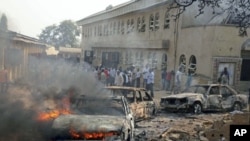The Christian Association of Nigeria, CAN, met with President Goodluck Jonathan at the State House in Abuja late Wednesday to express concern after the Christmas Day church bombings by Boko Haram. The president of CAN criticized the government’s security response to Boko Haram and suggested that Christians may have to defend themselves from Muslim militants.
At a news conference after their meeting about the Christmas Day terror attacks, which left at least 39 dead, the president of CAN, Pastor Ayo Oritsejafor, had some harsh words for Jonathan, himself a Christian.
"After consultation with the Christian community, which constitutes the majority of the Nigerian population, I have been mandated to convey as follows. The Christian community in Nigeria is deeply sorrowed over the deteriorating state of insecurity and apparent inability of the government to protect and guarantee lives, churches and properties of our members," said Oritsejafor.
Oritsejafor added that concerns are heightened by the lack of high-profile arrests. Boko Haram - which means “Western Education is Sinful” in Hausa - has been blamed for hundreds of deaths this year alone. The group wants to establish a strict Islamic state in Nigeria - a country nearly evenly divided between Christians and Muslims.
President Jonathan acknowledged the criticism, but said that terrorism is a new phenomenon in Nigeria and that the government is making adjustments to confront it. He called for the assistance of all Nigerians, Christian and Muslim alike.
"When we work together, we will get over it. The terrorists are human beings, they are not spirits. They live with us. They dine with us. So we know them. People know them, and as long as Nigerians are committed to exposing them, we'll get over this ugly situation," said Jonathan.
Immediately after Sunday’s attacks, Christian leaders in Nigeria urged their flock to turn the other cheek. But Pastor Oritsejafor said the lack of government response has forced the situation - signaling a change in the Christian rhetoric and a possible widening of Nigeria's religious rift.
"The consensus is that the Christian community nationwide will be left with no other option than to respond appropriately if there are any further attacks on our members, churches or properties," said Oritsejafor.
He also criticized Nigeria's Muslim leadership, saying that too few have come forth to condemn the activities of Islamist extremists.
Yet, in a similar meeting with the president earlier this week, Nigeria’s top Muslim spiritual leader - the Sultan of the northern Sokoto state, Sa'ad Abubakar - came forth to condemn the attacks.
"I want to assure all Nigerians that there is no conflict between Muslims and Christians, or between Islam and Christianity. There is a conflict between evil people and good people. The good people are more than the evil ones, and the good people must come together to defeat the evil ones," said Abubakar.
There is growing concern that the tension and insecurity will spark wide spread religious strife.
On Wednesday, seven were injured in a bombing of an Islamic school in the south, and three Christians were killed in the religiously mixed northern state of Plateau.
Nigerian Christians Dismayed by President’s Security Response
- By Nick Loomis




